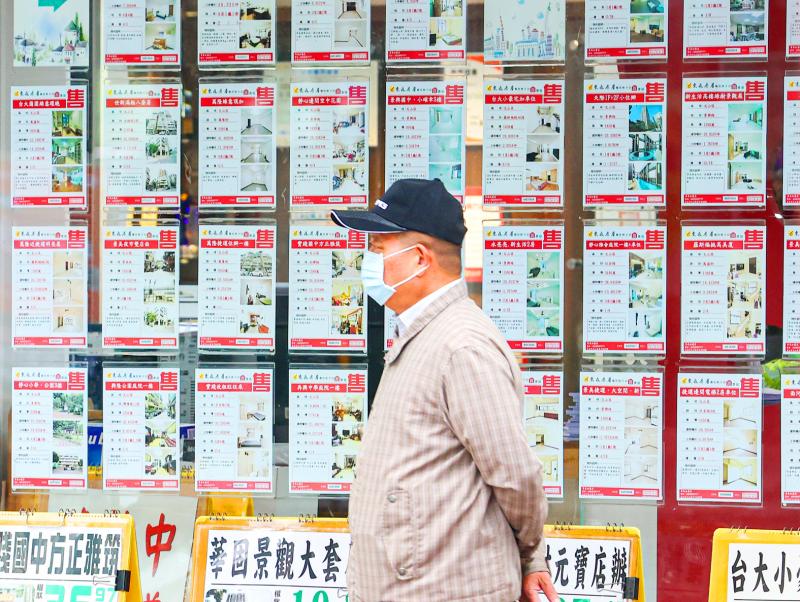The Kaohsiung City Government yesterday said it would impose a property hoarding tax as it is seeking to contain speculation in the real-estate market, calling recent price increases “abnormal.”
The announcement came in support of the Ministry of Finance’s call for local governments to levy a high tax rate on people with more than one property.
Ministry officials on Tuesday discussed strategies to rein in speculation with the nation’s six special municipalities, as well as the Hsinchu city and county governments.

Photo: CNA
About 84,000 out of 1.06 million housing units in Kaohsiung are not residential property, the city government said in a statement yesterday.
The city would implement the hoarding tax based on three principles: fulfilling housing justice, keeping individual houses intact and ensuring that owners do not pass on the costs to renters, it said.
The city government has not yet decided on the tax rate, which would be subject to approval by city councilors, it said.
The ministry levies a tax of 1.5 to 3.6 percent on non-residential housing units and allows local governments to add their own taxes, capped at 30 percent.
The Taipei City Government levies a 2.4 percent hoarding tax for units held by owners with fewer than two units and 3.6 percent for those who own more than three units.
The Kaohsiung City Government said it is also stepping up efforts to build 10,500 social housing units and offering subsidies for renters to safeguard people’s fundamental right of housing.
City authorities would continue cracking down on illegal housing transactions involving nonbinding contracts.
Meanwhile, the Tainan City Government is planning to impose a hoarding tax next year.
At the meeting at the ministry, representatives from New Taipei City, Taoyuan, Taichung, and Hsinchu city and county also agreed to impose hoarding taxes.

To many, Tatu City on the outskirts of Nairobi looks like a success. The first city entirely built by a private company to be operational in east Africa, with about 25,000 people living and working there, it accounts for about two-thirds of all foreign investment in Kenya. Its low-tax status has attracted more than 100 businesses including Heineken, coffee brand Dormans, and the biggest call-center and cold-chain transport firms in the region. However, to some local politicians, Tatu City has looked more like a target for extortion. A parade of governors have demanded land worth millions of dollars in exchange

An Indonesian animated movie is smashing regional box office records and could be set for wider success as it prepares to open beyond the Southeast Asian archipelago’s silver screens. Jumbo — a film based on the adventures of main character, Don, a large orphaned Indonesian boy facing bullying at school — last month became the highest-grossing Southeast Asian animated film, raking in more than US$8 million. Released at the end of March to coincide with the Eid holidays after the Islamic fasting month of Ramadan, the movie has hit 8 million ticket sales, the third-highest in Indonesian cinema history, Film

Taiwan Semiconductor Manufacturing Co’s (TSMC, 台積電) revenue jumped 48 percent last month, underscoring how electronics firms scrambled to acquire essential components before global tariffs took effect. The main chipmaker for Apple Inc and Nvidia Corp reported monthly sales of NT$349.6 billion (US$11.6 billion). That compares with the average analysts’ estimate for a 38 percent rise in second-quarter revenue. US President Donald Trump’s trade war is prompting economists to retool GDP forecasts worldwide, casting doubt over the outlook for everything from iPhone demand to computing and datacenter construction. However, TSMC — a barometer for global tech spending given its central role in the

Alchip Technologies Ltd (世芯), an application-specific integrated circuit (ASIC) designer specializing in server chips, expects revenue to decline this year due to sagging demand for 5-nanometer artificial intelligence (AI) chips from a North America-based major customer, a company executive said yesterday. That would be the first contraction in revenue for Alchip as it has been enjoying strong revenue growth over the past few years, benefiting from cloud-service providers’ moves to reduce dependence on Nvidia Corp’s expensive AI chips by building their own AI accelerator by outsourcing chip design. The 5-nanometer chip was supposed to be a new growth engine as the lifecycle